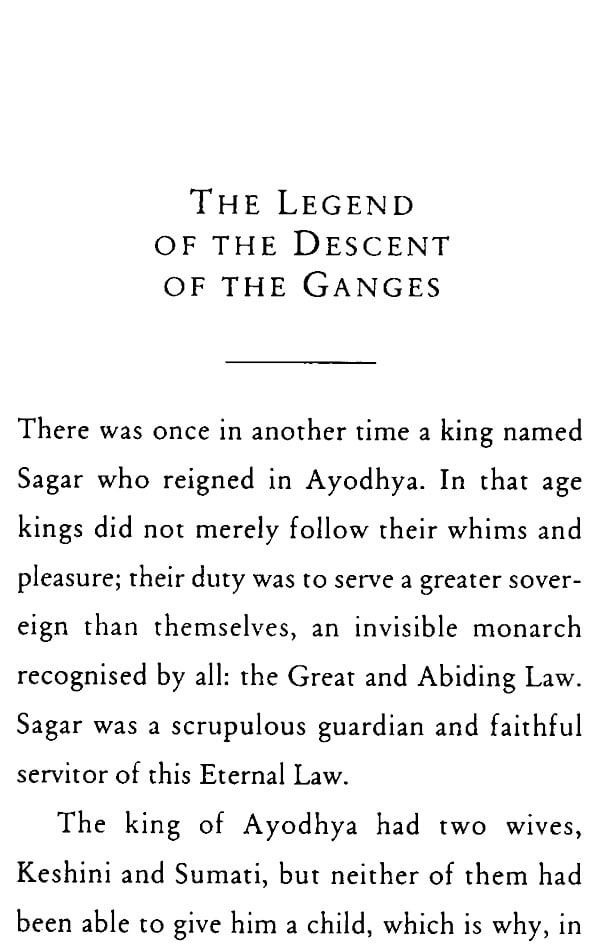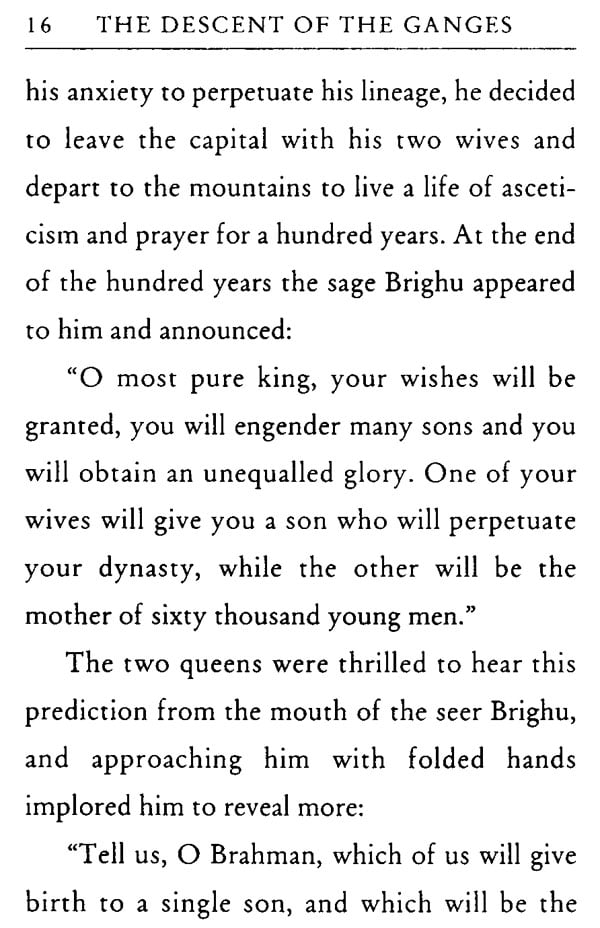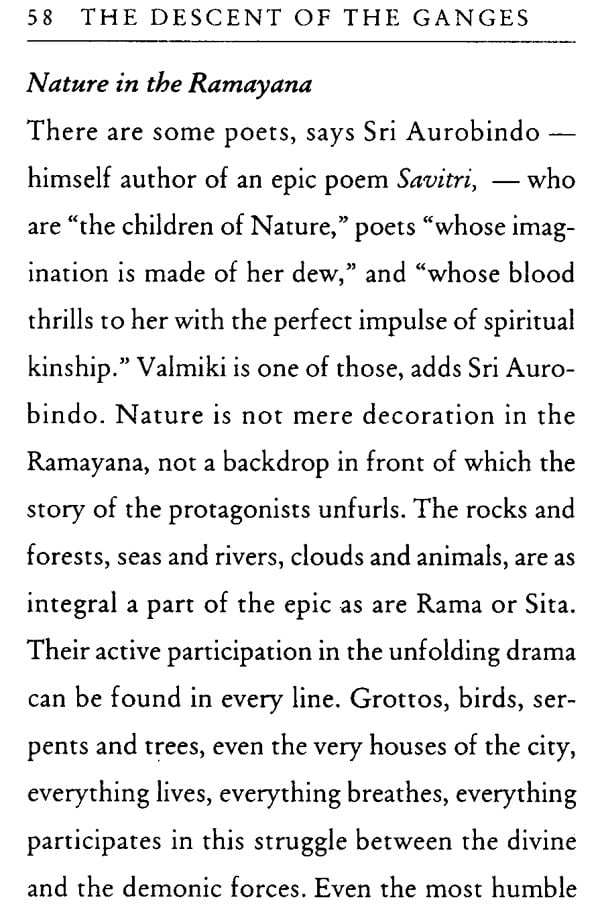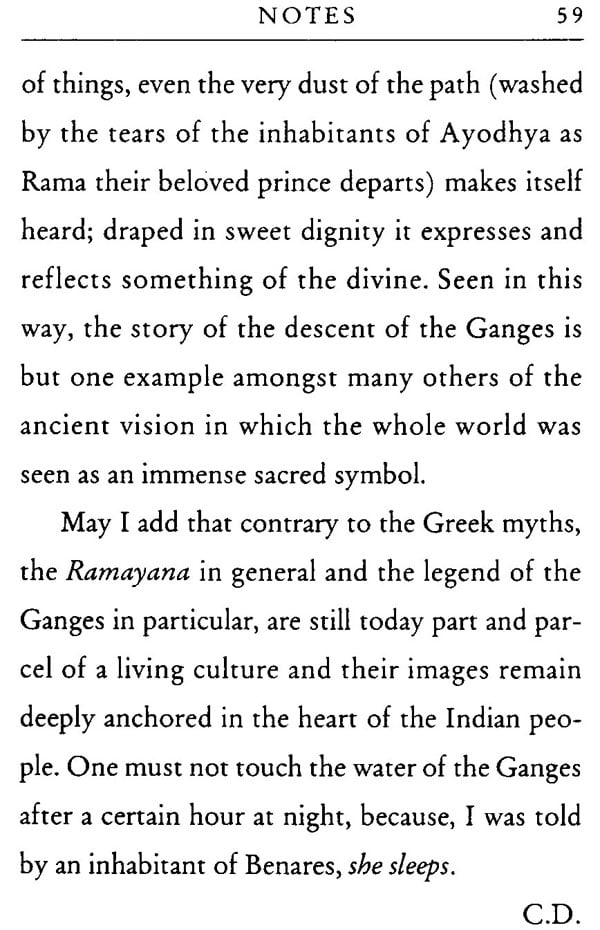
The Legend of The Descent of The Ganges (From the Ramayana of Valmiki)
Book Specification
| Item Code: | NAN184 |
| Publisher: | Auroville Press, Tamilnadu |
| Language: | English |
| Edition: | 2004 |
| ISBN: | 8187373016 |
| Pages: | 62 |
| Cover: | Hardcover |
| Other Details | 7.5 inch X 5.0 inch |
| Weight | 170 gm |
Book Description
About the Book
The sense of the infinite, said Sri Aurobindo, is "native" to the Indian mind. The ancient legends of India illustrate this point in a beautiful way. We invite the reader to abandon for a while his sense of symmetry and measure, and enter a strange and immense world, where all dimensions of space and time are on a huge scale – a world in which "the invisible always surrounds the visible". He will read the story of man who has the tremendous audacity to "grapple with the infinite" and sets out to conquer powers that are normally out of the human reach. The reader will marvel at the spirit of ancient Indian culture which, without "fear or littleness", knew how to set for itself such ambitious goals. To highlight the different aspects of the genius of India is one of the aims of this series, and a "boundless courage" as exemplified in the story of King Bhagiratha, is certainly a characteristic feature of thus genius.
To reconcile heaven and earth and inundate with light the most sombre recesses of our earth, cleanse our wounded humanity in the soothing and regenerating waters of redemption, is perhaps one of the oldest dreams of humanity.
This "rugged" reality that Rimnaud speaks of, this hard matter, this earth that resists, groans and cries out, to dig deep down therein a path for the bright, limpid, purifying waters to pour into, is a story that finds a deep echo response in all us. This old human dream of purity and sartling white ness – central to so many mythological tales – does it still not make our heart beat, perhaps today more than ever, in this age when man has managed to turn the waters of his rivers into foetid poison? To call down onto our poisoned and polluted earth, and us human and the little pile of ashes which is finally all that our lives amount to, a divine torrent that could cleanse all our stains – to echo Rimband agin – and deliver us from the obsessive shadows of the past and bring in a new Life, is this not what we sometimes dream of when we scrape and tea ourselves on life's "thorny reality"? Maybe this is why the ancient Indian legend of the Descent of the Ganges creates such a strange resonance in us.
One doesn't explain a myth, one can't dissect a story that is symbolical by using the tools of the intellect, except to impoverish it and make it lose precisely that which given the symbols it contains their strength and sacred resonance. This does not mean that they contain no meaning; on the contrary they are as laden with meaning as the clouds that herald the monsoon. But one cannot flatten out a storm cloud. Great and powerful truths hide behind these symbols, but they are truths that are round, plentiful, truths of the soul that only the poet sees and can communicate. The poet's words have the power to life a corner of the veil and show us a fleeting glimpse of the great forces at work behind our lives – forces that we can only guess at but which we would like to befriends, yet do not know how to approach. In this sense, the effect that a legend like has on us is similar to that of a powerful dream, from which we wake up with the impression of having touched a very deep secret of life.
The story of the Ganges is also the story of Bhagiratha, a hero of extraordinary will-power and courage. We are reminded of what Sri Aurobindo said about the ancient spirit of India: one of its constant tendencies was the impulse to follow each motive "to its extreme point and to sound its utmost possibility." The Indian spirit, he adds, knew that "without 'fine excess' one cannot break down the limits which the dull temper of the normal mind opposes to knowledge and thought and experience; and it had in seeking this point a boundless courage and yet a sure tread." Bhagiratha, the Seer-King, is a symbol of the bold and noble endeavour of that culture, and in its own vivid way the legend shows us what formidable powers the ancient Indians sought to harness.









